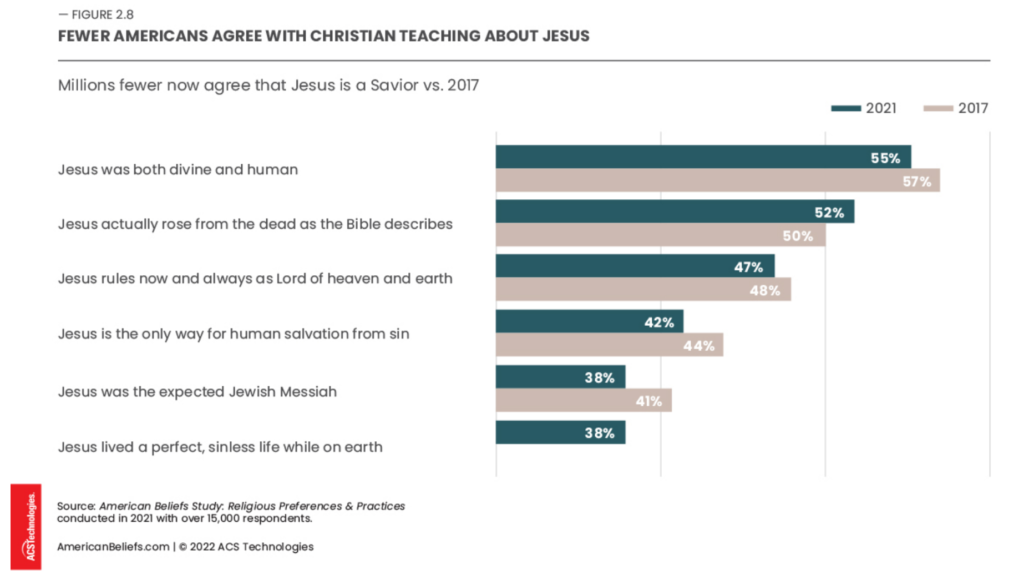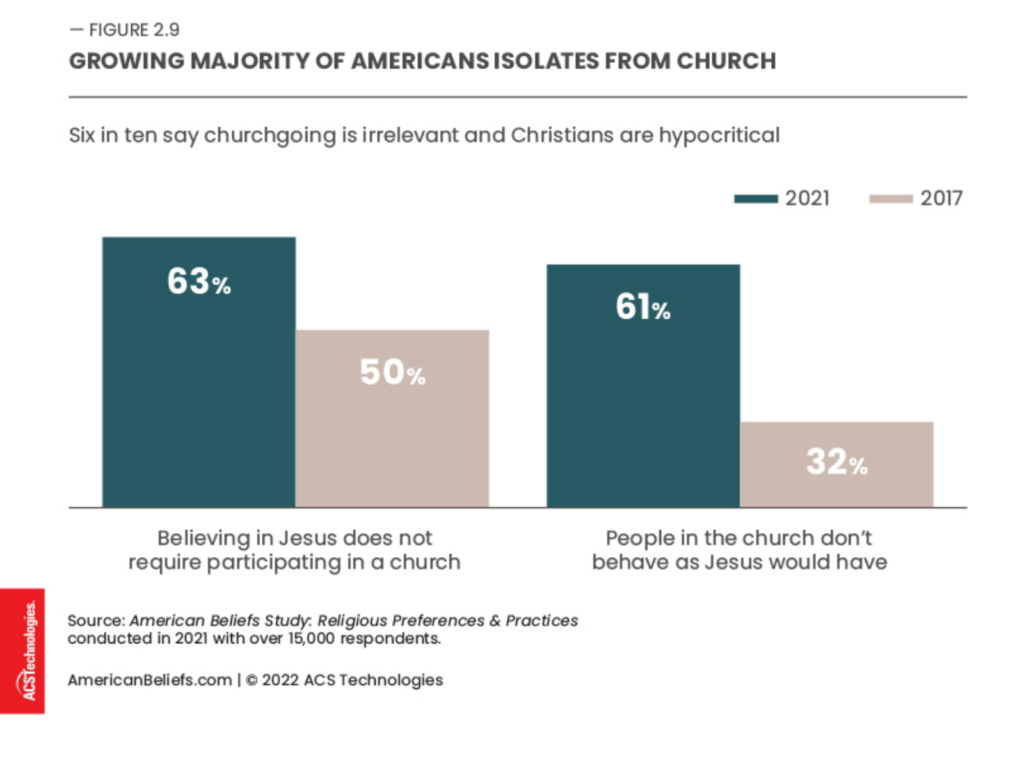Jesus asked his disciples, “Who do you say that I am?” He was pleased with Peter’s answer: “You are the Christ, the Son of the living God” (Matthew 16:15-16). As Christians, we believe this may be the most important question there is. So what do Americans today believe about Jesus? Who do they say he is? Believing in Jesus and participating in His church is what we explore in this article based on this study’s findings.
The American Belief Study, conducted in both 2017 and 2021, showed a list of eleven statements about Jesus to a carefully-designed, representative sample of 15,000 Americans. It asked whether they agreed or disagreed with each statement on a five-point scale, with ‘No opinion’ in the middle. In this post we focus on the top two ratings for agreement.
What the statements revealed
Six of these 11 statements were consistent with historic Christian doctrine. The responses shed light on what Americans in general believe about Jesus as against what the Church teaches.

Was Jesus both divine and human? Most Americans would say, “yes;” only 15% would say “no.” Did he rise from the dead? Half of the country would say, “yes;” only 20% would disagree. After those statements, the percentage agreeing drops, with only 38% agreeing that Jesus was the Messiah and the same percentage agreeing that he lived a sinless life while on earth.
The same American Belief Study has shown that 64.2% of Americans name Christianity as their religion. There is a gap between the number of people who say they are Christians and the number who agree with historic Christian teaching about Jesus.
47 million American Christians don’t fully agree that Jesus rose from the dead.
The diverse American religious landscape includes liberal churches that would not teach the physical, bodily resurrection of Christ, but the membership of these churches is not a strong percentage of the national Christian population, and their numbers are in decline. The membership of these churches is not large enough to account for the 47.1 million people we are considering here, not the mention the millions more who do not affirm the other statements in the list. This means there are millions of Americans from orthodox or relatively-traditional church background who do not believe, or maybe do not understand, basic Christian doctrine about Jesus Christ.
Figure 2.8 above also shows how American beliefs about Jesus are changing. For every statement in that list that appeared in both the 2017 and 2021 surveys, the percentage who agree is dropping. The percentage of Americans who agree with traditional Christian beliefs about Jesus is in decline.
What the responses showed
That level of decline is not nearly as dramatic as what was shown by the responses to two other statements from the study. The research did not just ask about theology – what people believe about Jesus – but also about the relationship between the Jesus of the Bible and the churches of today. Two questions addressed this, and responses to both saw a dramatic change in the past four years.

The first of these two questions asked whether participants agreed or disagreed with the statement, “People in the church do not behave as Jesus would behave.” In a way, this served as a hypocrisy meter. Christians seek to be like Jesus. We ask, “What would Jesus do?” and try to follow his way. In 2017, 32% of Americans indicated they believed church people fall short of Jesus’ example. In 2021, this ballooned to 61%, an increase of 29 percentage points in just four years. Americans’ opinion of church people’s faithfulness to the way of Jesus is in sharp decline.
The second question asked whether participants agreed or disagreed with the statement, “Belief in Jesus does not require participation in a church.” Nearly all churches would teach that Christian belief and attending a church go together. The New Testament strongly supports the idea of believers participating actively in communities of faith. In 2017, fully half the respondents (50%) agreed that faith in Jesus and participation in a church need not go together. In 2021, more than six in ten (63%) agreed with this idea, a dramatic increase of 13% in a short span of time.
The percentage of Americans who think it’s OK to believe in Jesus but not go to church is high and growing rapidly.
To summarize, the American Belief Study shows that the things Americans believe about Jesus are slowly separating from historic Christian tenets. Also, the traditional mindset that linked faith in Jesus with church attendance has eroded recently. This change is rapid. And finally, the share of Americans in 2021 who believe people in the church don’t behave as Jesus would have has, incredibly, nearly doubled to 61% in just four short years.
Key Findings:
- A majority of Americans (55%) believe that Jesus was both divine and human. A smaller percentage (38%) believe Jesus was the Messiah or that he lived a perfect life.
- Tens of millions of Americans who name their religion as Christianity do not agree with basic, historic beliefs about Jesus.
- The percentage of Americans who do not think church people live according to Jesus’ teaching and example is high (61%), and growing rapidly.
- The percentage of Americans who see no necessary connection between believing in Jesus and being part of a church is high (63%), and growing rapidly.
Ideas for Your Church:
- Don’t neglect the teaching of basic Christian theology – especially about Jesus. Don’t assume your people know and understand the central doctrines of the faith.
- When you teach theology, don’t just speak; listen. Find ways to ask your members what they believe. You might be surprised. It could then guide your teaching.
- Be alert to the reputation of your church and its members in the community. Ask, “What changes could we make that would cause people to see we are like Jesus?”
- Recognize that many people today, as they move toward faith, are likely to come to Jesus first, and then, only later, to his church. Provide ways for them to meet Jesus outside the church – such as through home-group or small-group ministry.
About this study
This online study among 14,942 American adults was conducted by Campbell Rinker for ACST from October 2020 through February 2021. Results were balanced by US region, 19 ‘Mosaic’ demographic clusters from Experian, and weighted by age to align with known population characteristics. The study carries a maximum margin of error of ±1.97% at the 95% confidence level within any US Census region. A comparative 2017 study involved the same size audience.
About the Authors
Dirk Rinker is president and CEO of Campbell Rinker, which has been a leading market researcher for nonprofits since the early 1990s. He has designed and implemented research projects for hundreds of prominent mission organizations, charities, universities, and museums in the U.S. and internationally – helping clients understand and act on the attitudes, motivations, and perceptions of their valuable constituencies.
Michael Jaffarian is a writer, researcher, and consultant to nonprofits. He and his wife were missionaries for 33 years, serving in Singapore, Virginia, Los Angeles, and England. Most of his ministry has been in global mission research. He has studied and written on growth trends among tens of thousands of Christian denominations globally.








